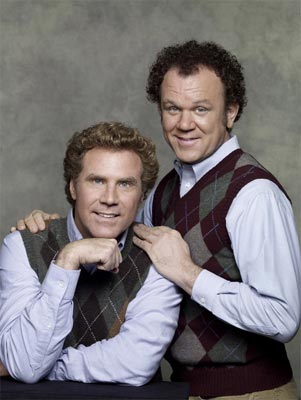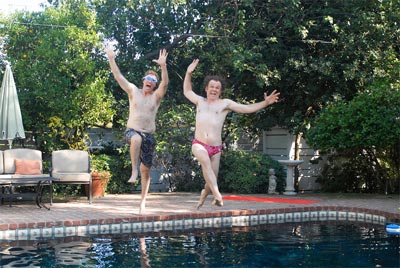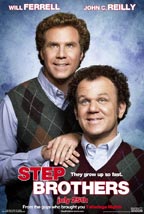Adam McKay Step Brothers Interview

ADAM MCKAY SAYS STEP BROTHERS HIS COMIC FINALE
EXCLUSIVE Adam McKay,Step Brothers Interview by Paul Fischer .Adam McKay first met Will Ferrell when they were both hired on TV's Saturday Night Live, and the pair have transferred their small screen talents to the big screen. McKay and Ferrel co-wrote the scripts for Anchorman, Talladega Nights: The Ballad of Ricky Bobby and now Step Brothers, all of which were also directed by McKay. But as he confessed to Paul Fischer, with the exception of an Anchorman sequel, it's time to move on and Step Brothers may be the last really silly comedy he does.
Paul Fischer: When you guys are working on a script like Step Brothers, and you decide that you're going to do it as an R-rated comedy, do you ever ask yourself, what is too much? What can we get away with? Where is the line?
Adam McKay: You know, I understand with comedies that you're really doing a dramatic film, that then is tweaked. You know? So in the case of this movie, your first obligation is, "Well, what is the story?" Like, "What are we doing here?" Even though it ends up really silly, you want to have enough of a foundation. It's got to be based on a story that you've felt or heard before. It's got to have its own unique thing. So the first thing we do is, in the case of this, we're doing an ensemble family movie. So you kind of think about all the ensemble family movies. You think about what they've done. You think about how you want to do it, and all that kind of stuff. Then from that kind of story, your ideas kind of bubble up. The only time we ever say, "Is this too much?" or "Have we gone too far?"-I'm trying to think if we've done - yeah. We, at one time, actually - because in rated R, I don't know. As long as it's not racist, or as long as it's not against someone's religion, or in some way condoning some sort of ideological ugly belief, or something, I don't care. I don't find dirty humor offensive at all. I think it's playful. Violence, I think, is much more sketchy than that. So I never mind the language or anything. The only time we backed off something was, for Talladega Nights, there was talk - it was just talk - of having Sascha Baron Cohen's character be Muslim. And we backed off it. We did. Because we were trying to think of the Nascar nightmare. What's the one person that would scare the hell out of a Nascar fan? And we thought - well, it was gonna be a combination. It was gonna be French. We had the idea of him being gay. We had the idea of him being Muslim. He wanted a combination. So we were thinking a French Muslim would be just a nightmare to a Nascar - and we thought, "You know, we could so easily go somewhere else. I don't know if anyone wants death threats. Let's just lay off this." And so we backed off that. I think that's the one time ever we backed off something.
Paul Fischer: As a writer-director, do you consider yourself to be subversive?
 Adam McKay: Yeah. Oh, yeah. I would hope so. I think comedy, inherently, even the supposed dumbest stuff, which I'm sure plenty of people would say our movies are, has to be subversive. It has to be surprising and subversive to what you expect. I mean, just on the base level of, an audience walks in, they have certain expectations. You know, we know what films Will's done before this. We know what other comedies are out there. We know what dramas are out there. We know where the country's at. And you try to surprise, off of that. You try and do something that people aren't expecting. So there's that level, as well. And then I think there's hopefully a bit of a point of view to these movies. It's not - we don't want to bang people over the head with it. But in the case of Talladega Nights, I think we were skewering the red states mentality. You know, the people who elected George Bush. And Anchorman, it was all about sexism, and just how ludicrous sexism is when you really look at it. And with this movie, it was like - the whole idea was, The American Man. What is The American Man? We're in a country now where there's 16 million adults living at home right now, higher than it's ever been. It's gone up 70 percent since 1995. And also, our president walks around with a cowboy hat on. Which, if you think about it, is insane. Like, it'd be like a president who walked around dressed up as a pirate. And he talks in a fake southern accent, too. He's not even from Texas. And he talks like this. You know? And it's like - so what does it mean to be a man? So, those questions do go in. Once again, the primary goal is to do a really funny movie that's surprising and shocking. And then those ideas sort of can't help but filter through it. So.
Adam McKay: Yeah. Oh, yeah. I would hope so. I think comedy, inherently, even the supposed dumbest stuff, which I'm sure plenty of people would say our movies are, has to be subversive. It has to be surprising and subversive to what you expect. I mean, just on the base level of, an audience walks in, they have certain expectations. You know, we know what films Will's done before this. We know what other comedies are out there. We know what dramas are out there. We know where the country's at. And you try to surprise, off of that. You try and do something that people aren't expecting. So there's that level, as well. And then I think there's hopefully a bit of a point of view to these movies. It's not - we don't want to bang people over the head with it. But in the case of Talladega Nights, I think we were skewering the red states mentality. You know, the people who elected George Bush. And Anchorman, it was all about sexism, and just how ludicrous sexism is when you really look at it. And with this movie, it was like - the whole idea was, The American Man. What is The American Man? We're in a country now where there's 16 million adults living at home right now, higher than it's ever been. It's gone up 70 percent since 1995. And also, our president walks around with a cowboy hat on. Which, if you think about it, is insane. Like, it'd be like a president who walked around dressed up as a pirate. And he talks in a fake southern accent, too. He's not even from Texas. And he talks like this. You know? And it's like - so what does it mean to be a man? So, those questions do go in. Once again, the primary goal is to do a really funny movie that's surprising and shocking. And then those ideas sort of can't help but filter through it. So.Paul Fischer: Where does the sense of subversion within you come from, in terms of your own background?
Adam McKay: I know, it's funny. I was talking to somebody about it the other day. And I just remember when I was in first grade, they would do the announcements over the speaker at the beginning of the day. And they would just say stuff like, "Today's lunch is sandwich with apple, and the buses are gonna be in this order. Make sure to go out through the back door." And it's very generic stuff. Every day the same thing. And everyone would get this very serious look at their face, and just look at the speaker like it was the speaker of truth. And I remember in first grade, it drove me crazy. I would goof around during the announcements. And be like, "Will you take it easy?" And everyone was so kind of sanctimonious about the announcements. So I think there's some of that. Also, we - I think just growing up, I was always a fan of crank phone calls and pranks, and kind of just turning stuff upside down. I don't know where that would come from.
Paul Fischer: Were you a very undisciplined kid?
Adam McKay: No. You know, I could be. But I got okay grades. I wasn't getting bounced out of schools or anything. I'd get into trouble, occasionally. I was definitely occasionally getting teachers telling me to be quiet. But I think also - you know, we were pretty poor when I was a kid. Like, we were - literally lived in Worcester, Massachusetts. We were on food stamps. My Mom was a waitress. And then we moved to Pennsylvania to a much nicer area where there was, like, a rich section. So I think there's some understanding, too - it drives me crazy, Americans just have such a limited point of view. They don't understand class systems. They don't understand that the myth of upward mobility is actually a myth. We're the 17th country in the world when it comes to upward mobility. They don't get it that America's not perfect in a lot of ways. And so the best way to do that is to kind of make fun of those assumptions, I think, on some level. But then I think also I just loved to laugh. I think that's a big part of it. I just remember seeing Airplane and laughing so hard that I was, like, physically ill. And I just loved to laugh. So that probably is the biggest drive. I tried to go deep on the other ones. I'm not sure that's exactly what it was. But definitely I love to laugh.
Paul Fischer: How tough was it for you to break into comedy?
Adam McKay: I had a great time of it, because I walked in with no expectations. I just loved doing it. So I was doing stand-up in college, and I didn't think I was good. I was just - I loved doing it. So I did stand-up on the weekends. And I just had a great time. And then a buddy of mine told me about improv in Chicago. You know, they do long form improve. They do improvised plays. And this guy, Del Close. So I went out there and did that. Once again, with no expectations whatsoever. So the fact that I never expected to be making a living at it - I never - I just did it because I loved it. So then when I would get some degree of success it'd be like, "Whoa, this is great. This is nice." But there was always part of me thinking, "Well, I won't keep doing this, of course." And because of that, I don't ever remember it being painful, or, like, a struggle. It was always - we were having a great time, even when we were broke. So. I think if you go into it with no expectations of making money, having great jobs, or anything like that, you'll do fine. I think people get really frustrated when they're like, "Why aren't I making money? Why aren't I successful?" You know, that's when it gets painful.
Paul Fischer: Did you and Will meet on SNL?
Adam McKay: We did, yeah. We got hired on the same day, in '95. And went out for beers that night. But I didn't really start working with Will 'til a couple shows into that first season. Because he's very unassuming when you meet him. And then I started getting that he has a really subversive sense of humor, and likes to do bits, and likes to try odd stuff that kind of puts an audience ill at ease. And you wouldn't guess it from, you know, his big kind of successful stuff like the cheerleaders. But he's got a really subversive sense of humor. So the two of us kind of clicked, I think, on that level.
Paul Fischer: Are you surprised that you have become a filmmaker of such success as opposed to a performer?
Adam McKay: When I was in college, I always thought - in fact, when I was thinking, "I'm not gonna be doing comedy," I always wanted to be a writer. I was - you know, wrote fiction, and thought I would be a journalist, or I would-you know, maybe direct and write screenplays. I took a lot of screenwriting classes. I never even imagined being a performer. And what I loved about performing was writing. I loved doing stand-up because you write your own material. I loved improv because you come up with it on your own. And so when I went to SNL, that was the fun of it, writing this stuff, and then seeing it come to life.
Paul Fischer: The process of writing a script for you involves a bit of performing on the side, doesn't it?
Adam McKay: Yeah. Definitely. I don't feel in any way shortchanged when it comes to performing. Because I get to work through the whole script with Will. And then even on the set, there's always part of me that's a performer's mentality. I can kind of feel a little bit where they're coming from, as far as - okay, if I were that character, what would I do, is kind of the operative question. So whenever I'd see a scene - and I see a chance to kind of heighten it or something, it's from my experience as a performer. You know, knowing - it gives me a good sense of audience, I think. That's the main thing you get from it. Whenever there's aspiring writers, I always tell them, "Go perform. Go take an acting class, take an improv class. Even if you have no intention of doing it. It'll only help."
Paul Fischer: Obviously, a large chunk of this movie and its predecessors is improv. As a filmmaker, what are the challenges of being able to reign that in, to the point where you're able to go into the editing room and cut what you need for the purposes of economy? Because obviously it's a lot of stuff that you can't use.
Adam McKay: Oh, it's a ton of stuff. Yeah. And you know that coming in. I mean, we knew it with Anchorman. Although we were a little more naïve with Anchorman. We looked at the first three-hour cut and thought it played great. We were like, "This is amazing." [LAUGHTER] We were like, "We're totally happy with it." And kind of had the same thing on Talladega. Like, had a two hour fifty minute cut that we loved. And then you put it in front of an audience, you see you're out of your mind. You know. So this one, I was much more realistic coming into it. I knew that we were gonna be slaughtering a lot of things that we loved. But it's - I don't look at it as an inconvenience at all with the improv. I feel bad for directors that just shoot the script. Because in my case, once I start stringing this together, to tell a - you know, to have an arc to it, to have some sort of forward motion, I can go check the dailies, and we can make anything work, because I've shot so many options. You're almost writing in the editing room, is what you're doing. So I can't imagine shooting a movie, a comedy, especially, without multiple takes.
Paul Fischer: How beneficial has DVD been to you, as a comedy director?
Adam McKay: Oh, it's fantastic. Because all these scenes you love get seen by the real fans. And it's the best. It's - the refrain around the edit room is, "It'll be on the DVD." You know, any time people start moaning about a scene we've cut, it's like -
Paul Fischer: If it's at all possible, will there be an uncut version of the movie on DVD?
Adam McKay: We're doing an extended version. I think we're putting, like, an extra 12 minutes back in. But all the cut scenes will be on the DVD. I mean, there's a ton of them. So. Yeah, it's - I think - probably, without exaggeration, like, another hour and 20 minutes, hour and a half, of full scenes that weren't in the movie. If there was any way to string it together like Anchorman into another story, I would have done it. But there's no way. This is such a singular premise, that you can't create a second tale out of it.
Paul Fischer: No Stepbrothers Two?
Adam McKay: I don't think so. I mean, you could do a Stepbrothers Two, but it would be completely different. But I don't think so. These feel like - this felt like a one-time scenario for us.
Paul Fischer: Or Talladega. Do you have any desire to revisit?
Adam McKay: I don't think so. We don't like sequels that much. I mean, I always feel like, why? When there are so many other ideas you can do. And - I mean, Anchorman's different.
Paul Fischer: Were you surprised by its success?
Adam McKay: Yeah. Yeah. But we got very mixed responses. Like, the critical response was 50-50.
Paul Fischer: Really?
Adam McKay: Oh, yeah, because it's such a specific world that you have to kind of get used to. The first 20 minutes of that movie never played great, because people were kind of adjusting to the rhythm of it. And then people loved it on repeat viewing. But - and really, I think Talladega's the same thing. Talladega's a movie, if you watch it over again, it plays very well. Whereas the first time, you think, "Oh, it's a racecar comedy." And I think this will be the same thing. I think it's like - these dense kind of worlds, with their own logic you kind of go into. But as crazy as this movie is, it's actually technically, the setting of it - it's the most grounded of the three we've done, as crazy as that seems. I mean, because you look at Ron Burgundy, that's complete fantasy-land, where they have giant gang fights. Talladega Nights, you've got guys jumping out of racing cars, racing each other. You've got this gay Frenchmen. You've got this insane large archetypes. But this is just a family. I mean, it's like, a very straight intro to the whole idea. Just people pulling up and moving in together. And then as it heightens, it gets crazier and crazier. I think it's the dirtiest one we've done.
Paul Fischer: Where would you place Ron Burgundy at this particular point?
Adam McKay: We have a couple ideas. I don't want to say them, though, because we've still got to kind of flesh it out, you know? So I don't want to say an idea. But there are some ideas, yeah.
Paul Fischer: Would you stay within the same period, or would you advance it?
Adam McKay: We have an idea. I really don't want to say. We have an idea about - yeah. You'll see, because it's still a little ways off. We just started talking about it. But I don't think you can go - the one thing I'll tell you is that it's not contemporary. It's not now. You have to stay - because the whole joke of Ron Burgundy is that he's dealing with change. And if you're current day - well, what is that change? So, yeah. I mean, the biggest thing now would be the incorporation of the news, I guess. But that really happened, like, ten years ago. So, yeah. It'll definitely be a period movie again.
Paul Fischer: I know that you have another movie that you want to do before then. Can you talk about what that is?
Adam McKay: Yeah. It's a script my friend Dennis McNichols and I wrote. We did a page one rewrite on a script, and it's called Channel Three Billion, and it's kind of a Brazil-type science fiction. Slight comedy, but not heavy comedy and I'm really excited about it.
Paul Fischer: How science fiction-y is it?
Adam McKay: Pretty science fiction-y. Yeah. It's a little bit - you know, it's a common theme you hear, the dystopic future world where people are kind of removed from reality, and it's like, no one leaves their apartments. It's that world. It's all - everything outside the world is scary, so no one ever leaves their apartment, is the idea of it. And it's about a guy who falls in love with a woman through this kind of Internet TV sort of experience. And then there's also a killer going on around. But I'm excited about it. I want to do it like Sin City, with the painted backgrounds, and really do a strong visual movie on this.
Paul Fischer: It seems a lot darker than stuff we've seen from you.
Adam McKay: Oh, yeah. No, this is not in the vein at all of these three comedies I've done. This is definitely a little darker, yeah.
Paul Fischer: How far in the future is it?
Adam McKay: This is, like, 100 years in the future, not that far.
Paul Fischer: You haven't cast it, or anything like that?
Adam McKay: No, no. We - just as I'm finishing this, I'm now picking up the script. It needs to be rewritten, and starting to work on it.
Paul Fischer: You have a studio interested yet?
Adam McKay: No. No, we haven't done that yet. We haven't even sold it. I think it's owned by Radar, the script. Off of our rewrites. So they'll partner with someone, and we'll see where we want to get it going. But yeah. I'm excited about that. I love that 300, Sin City style, man, with the illustrated backgrounds.
Paul Fischer: You want to shoot everything on green screen?
Adam McKay: We'll shoot a lot of it on green screen, mixed with practical, real stuff in the foreground and then some scenes are completely practical.
Paul Fischer: How do you think comedy has evolved in Hollywood? Or do you think it has evolved?
Adam McKay: Well, I don't know if it's evolved. Because you can look back, and - you know, Marx Brothers, to me, are still the funniest comedy troop ever. And there's been other periods, like with Albert Brooks, where he did all of his great movies. So it kind of goes up and down. And I think it's all dependent on the times, what's going on.
Paul Fischer: Would you like to do a completely different style of comedy to these three movies? I mean, do you have aspirations to do something very, very different in tone?
Adam McKay: Yeah. I like - you know, I love what Judd does, with his completely realistic sort of character-driven comedies, are really fun. I'd love to do one of those at some point. Although I gotta say, I am drawn to the absurd. I do like stuff that kind of tweaks or twists, or is amplified.
Paul Fischer: Who influenced you? Who are some of your great comedy heroes?
Adam McKay: Well, I love Albert Brooks. you know, Lost in America is one of my favorite movies. Real Life is fantastic. I love those. You know, as far as - I think a lot of the movies that Will and I have done - all three of these movies are kind of influenced by, like, Airplane. I love movies that get that rolling laughter, where you just lose control when you're in a theatre. And that's kind of our goal, is to get that, like, velocity going, where you're just laughing and laughing. But I like a lot of different stuff. There's a movie I've been talking about called Mail Order Wife, is one of my favorite comedies right now. Idiocracy, I love. That was one of my favorite movies. I like Mike Judge a lot. I think he's really smart and satirical.
Paul Fischer: Would you and Will want to work on something very different?
Adam McKay: Yeah, I think this was it. I think we've always said we were gonna do these three comedies.
Paul Fischer: How many - I mean, he plays - he's a very smart guy, Will, obviously. And yet he's played these very intellectually inferior characters, shall we say.
Adam McKay: Well, I think it's a little bit like the Homer Simpson game. Where it's like, people mistake it, because it's a dumb character. They think that he's dumb. But you have to find - Will's brilliantly dumb. I mean, that's the beauty of it. And that's not easy to do. You know? You see a lot of people fail at it, when they're just dumb. But yeah, a lot of people say ,"Oh, it's the Will Ferrell thing." I'm like, "Really? What's the Will Ferrell thing?" Like, he's done - his movies are so different, if you actually look at them. Like, he did the kind of larger characters with me, like the American hero archetypes. Then he did Elf, which is a kid's Christmas movie. Then he did Old School, where he's like a frat guy type thing. And then this is - he's a frightening character in this movie. He's actually nothing like the other ones we've done. But I think in general, people think, "Oh, it's a comedy. They're acting childish." And I would argue that every single comic in the history of comedy, it's based on not being mature in one area of your life.
Paul Fischer: You think that this trio of comedies is probably as far as you can go exploring that style of -
Adam McKay: Yeah, probably. I think so. Although one more Anchorman wouldn't be bad. I think Anchorman has an absurd level to it that's different than the rest of the comedies. There is this kind of - the sky's the limit kind of thing, with Anchorman. You can literally do whatever you want in that world, and that's why we would do a sequel. Whereas the Nascar world, you can really only do so much in there. This world, the family comedy - okay, I guess you could do other stuff. But I feel like we assaulted this pretty hard. I don't know if there's a need to go back to it. So, yeah. It's just the one we might go back to. Or, Anchorman Two is the one we'll do. But beyond that - no, I said if I was doing another movie with John and Will, I would want them to be doctors. I would want them to be, like, professors at a university. I think now they should play hyper-adults. I think that's the way to go, you know?
Step Brothers
 Starring: Will Ferrell, John C. Reilly, Mary Steenburgen, Richard Jenkins, Adam Scott
Starring: Will Ferrell, John C. Reilly, Mary Steenburgen, Richard Jenkins, Adam ScottDirector: Adam McKay
Screenwriter: Will Ferrell, Adam McKay
Genre: Comedies
Will Ferrell and John C. Reilly, who last teamed in the box-office smash Talladega Nights: The Ballad of Ricky Bobby, now star in Step Brothers, directed by Adam McKay (Talladega Nights). In Step Brothers, Ferrell plays Brennan Huff, a sporadically employed thirty-nine-year-old who lives with his mother, Nancy (Mary Steenburgen). Reilly plays Dale Doback, a terminally unemployed forty-year-old who lives with his father, Robert (Richard Jenkins).
When Robert and Nancy marry and move in together, Brennan and Dale are forced to live with each other as step brothers. As their narcissism and downright aggressive laziness threaten to tear the family apart, these two middle-aged, immature, overgrown boys will orchestrate an insane, elaborate plan to bring their parents back together. To pull it off, they must form an unlikely bond that maybe, just maybe, will finally get them out of the house. The screenplay is by Will Ferrell & Adam McKay from a story by Will Ferrell & Adam McKay & John C. Reilly. Jimmy Miller and Judd Apatow produce.
MORE
- Viggo Mortensen The Road
- 24 Cast Reunion
- Aaron Eckhardt No Reservations
- Aaron Eckhart The Dark Knight
- Adam McKay Step Brothers Interview
- Alan Alda Diminished Capacity Interview
- Alan Alda Diminished Capacity Interview
- Alex Dimitriades
- Al Pacino Oceans 13
- Alan Rickman Snow Cake
- Alan Rickman Sweeney Todd



